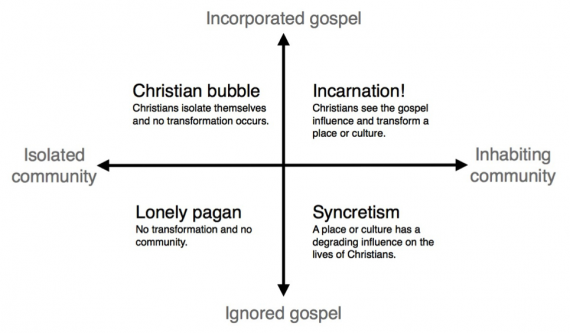
Any community that wants to be on mission with Jesus has got to be marked by incarnation. The heart of incarnational ministry is to encounter the love of God and to embody that love in a particular place with a particular people. Look at any community that has brought the gospel to a new environment in a transformational way and you’ll see them encountering the love of God and embodying his love in that place. They incarnate the gospel and lives are transformed. Sounds great right? So why isn’t every Christian community living incarnationally? We see two ways that a community can miss the mark of incarnation and fail to see transformation occur. We can fail to inhabit a community and we can fail to actually incorporate the gospel into our lives.
Inhabit or Isolate
Even communities that have the intention of being incarnational will face the temptation to isolate from the people and context where they wanted to embody God’s love in the first place. This is represented in the upper left quadrant of the image above. Maybe the neighborhood, bar, people group, or campus is just a difficult or discouraging place and the temptation arises to band together and focus inward. College campuses are often viewed this way.
When I graduated from high school a pastor gave be a book that was called something like Surviving College with your Faith. Might Jesus want more for college students than to just get through college with their faith intact? Might he actually think that college bound disciples filled with His Spirit could be agents of transformation on their campuses? Even the title of the book I received suggests that the campus environment will be dangerous for faith and that you would be wise to find a safe place to escape from its negative influences.
When I got to campus I found a community that was on mission with Jesus. They were more interested in sending me to my dorm to embody God’s love than extracting me from my dorm to live in a safe Christian bubble. If we incorporate the gospel into our lives but isolate ourselves from our community then we’ll see no transformation. We are merely another Christian social club living in a safe bubble away from the dangerous world.
To inhabit a place as a community means that we put down roots, make ourselves at home, and choose to identify with that place. We invest in relationships there with presence and proximity. Obviously, when we choose to make a place our home in this way we’re taking our cues from Jesus who “made his dwelling among us” (John 1:14).
Incorporate or Ignore the Gospel
On the other hand many Christian communities find it easy to really inhabit a place. They love their city! They enjoy broad friendships with non-Christians and aren’t at all interested in isolating themselves from that community. But if we aren’t incorporating the gospel into all of our lives and growing into disciples who look like Jesus then we won’t really have anything to offer the community we inhabit.
This was me in high school. I guess you could say that I really inhabited the community of my high school. There just wasn’t anything that set me apart from anyone else. At some point I mentioned church in a passing comment to a friend that I’d had for years. His response makes me cringe even now. “Eric, you’re a Christian?!?! I had no idea! I never would have guessed that!”
If we inhabit a community and live life there but ignore the gospel in our lives then we are transformed by the prevailing culture instead of the other way around. This is represented in the lower right quadrant of the image above.
The Incarnation Sweet Spot!
But if we inhabit a community and really incorporate the gospel then we’ve hit the incarnation sweet spot! When we incorporate the gospel and live like Jesus we’ve got a message that’s not just spoken, it’s authenticated by the power of God and modeled by our lives. And when we move in to a place and don’t just commute in, we’ll have the trust and relationship to really communicate that message. To incorporate the gospel into all of our lives and to inhabit a community in presence and proximity is incarnational ministry that will transform our neighborhoods, campuses, and cities.
Where do you see yourself/your church/your ministry in the image above?
What are steps you can take to really inhabit your community?
Are there places that you already inhabit where you’re not embodying the gospel?

Sign up to receive our blog posts via e-mail and get instant access to our APE Library with videos, seminars, leaders notes, and more.

